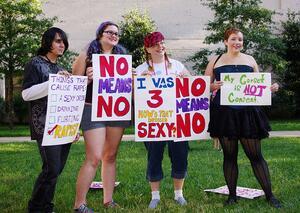From Hasidic Rock to the Dangers of Slut-Shaming at JOFA
I had been eagerly anticipating the Jewish Orthodox Feminist Alliance (JOFA) conference for months. Happily, it did not disappoint.
Although one might think that Orthodox feminism has a very narrow focus, it really is a multifaceted issue; I went to sessions about musical artists, eating disorders, slut-shaming, and Women of the Wall, and spoke on a panel about Jewish feminist blogging.
The session about slut-shaming was particularly enjoyable. I was drawn to the panel because of speaker Leora Tanenbaum, the author of Slut!: Growing Up Female with a Bad Reputation. Ms. Tanenbaum presented her research on how negatively the label slut can impact a girl or young woman, and urged attendees to boycott this word. I also really liked co-presenter Rachel Hercman’s discussion of how slut-shaming within the Orthodox community usually manifests itself around tzniut (ritual modesty) and shomer negiah (the prohibition of touching the opposite sex). Overall, this session made me think harder about the social conventions of the different communities I’m part of and the balance I try to strike in my roles as a teenage girl, college student, feminist, and Orthodox Jew.
What made the panel even more interesting was the choice of moderator: Dasi Fruchter, a student at Yeshivat Maharat. I am unused to seeing Yeshivat Maharat affiliates in spaces divorced from religion or the topic of women in the clergy, but Ms. Fruchter brought a valuable perspective to the conversation, discussing the controversy that arose over the article she wrote about red lipstick earlier this year. Her role here was a good example of the efforts that JOFA is making to mainstream maharats and showcase them as individuals with diverse interests and abilities, rather than pigeonholing them into discussions of their religious roles.
This marks a change, or at least a change in the making, that JOFA is actively facilitating within the community at large. There is no doubt that Modern Orthodoxy is shifting, and a large part of this development is being made as a direct result of JOFA’s advocacy for ensuring women’s voices are heard in the community.
On one hand, these changes make me hesitate. There was always a divide between Modern Orthodoxy and right-wing Orthodoxy, but this divide is quickly expanding, partially because of the changing status of women that the Modern Orthodox community has begun to embrace. This has difficult implications for me personally. As someone who was raised in a pretty centrist home and went to a solidly Modern Orthodox coed elementary school but chose to attend a Bais Yaakov-type high school, I no longer identify with any permutation of Orthodoxy; I prefer to call myself just Orthodox.
Although there’s been a lot of discussion about the unimportance of labels within Orthodoxy in the past few months, my lack of ability to self-identify has practical repercussions. After the conference, JOFA sent out a survey for attendees. One question asked for denomination. I was stuck between choosing “Modern Orthodox” and “Haredi Orthodox,” since there was no option for simply “Orthodox.” What in the world is “Haredi Orthodox,” anyway? I surely am not Haredi by any definition, but don’t really think I fit into the Modern mold, either. I felt annoyed that JOFA hadn’t provided more of a centrist Orthodox option in the survey; I guess this erasure just reflects the on-the-ground reality of the Orthodox community. We all have to take sides; those of us who straddle this divide, like myself, will just have to choose the community to which they want to belong.
On the other hand, I’m happy to see these changes. They herald a new era for Orthodoxy, one where women who wish to live within halakhic bounds will have more opportunities to connect to God and serve their communities. As a feminist, I very much agree with JOFA’s mission statement to “expand the spiritual, ritual, intellectual and political opportunities for women within the framework of halakha.” As much as my belief in these ideals may complicate my denominational identity, it’s more important to me that women who follow halakha are able to express their Jewish identity in the way they feel comfortable. Having been to the JOFA conference, I know that this will become a reality.






